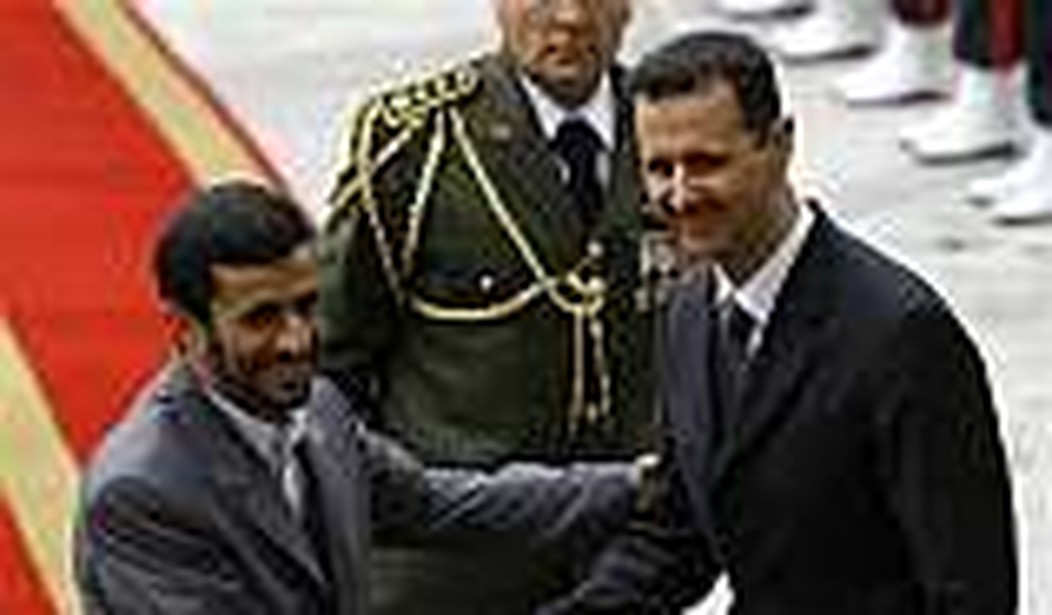Despite his harsh words and hostile political posturing, Mahmoud Ahmadinejad likes to smile and laugh, and is known for making little jokes with young reporters.
During his trip to Damascus last Thursday, Ahmadinejad wasn’t just smiling – he was glowing. His body language radiated enjoyment and affection, especially when he saw Hassan Nasr’allah, the head of Hezbollah.
Ahmadinejad had every reason to be happy. He was relieved. The background: recently, Iran had begun to worry about Syria’s peaceful gestures towards Israel. All of a sudden, the Syrians were openly calling for talks with Israel, in direct contrast to their previous promises to Iran that they would never make peace with the Zionist enemy until the Golan has been handed back. Things got particularly bad for Iran when the Syrians even said those talks could take place without preconditions. Conservatives in Iran felt abandonment set in. Damascus started looking like a two-faced friend, ready to dump Iran and its years of military and financial assistance, for the greener pastures of peaceful relations with the West and Israel.
To Ahmadinejad’s joy, the peace gestures went nowhere. The West did not take Assad’s calls for talks seriously because of his continued support of Hezbollah and Hamas. Furthermore, Ehud Olmert’s weak position at home following the Lebanon war meant that even if he did come to an agreement with Assad, he would most probably not be able to deliver.
Still, the Iranians were so worried about losing Damascus, that according to a report from Sharq Al Wassat newspaper, during the recent visit, they agreed to provide Syria with $1 billion worth of military equipment from their own stocks and also with purchases from Russia and North Korea. Furthermore Iran also agreed to provide assistance to Syria’s nuclear research program.
Although Iran seems to be paying through the nose for its friendship with Syria, for now, Tehran has no other choice. Iran is becoming more isolated every day. Its deterrence policy relies heavily on its relationship with Hezbollah and its ability to strike at Israel. If Iran lost Syria as an ally, it would be far more difficult to supply Hezbollah with weapons. This is something Iran can ill afford now. Perhaps when it has real nuclear capability, it will not need to panic so much.
But for now, a billion dollars maybe a worthwhile investment in Iran’s efforts to scare the West away from an attack against its nuclear installations.
On the surface, it seems that the Syrians did well out of this whole deal. They got someone else to bankroll the purchase of much-needed weapons.
The reason they got such a good deal is because Iran’s position is weak. It has no one else to turn to.
However if and when Iran’s position does improve, whether it is because of nuclear advancement, or unexpected improvement in relations with the West, it is very likely that the Iranians will return to ask for more bang for their buck. The Syrians should realize that the Iranian gravy train will not go forever.
Iran also has bones to pick with Damascus, notably over its support for Sunni militants who cross its border into Iraq, and murder thousands of Iraqi Shiites, who Iran views as its allies.
Sooner or later, Syria will have to start paying a higher price for its friendship with Iran by reducing its assistance for these militants.
It may seem like a nice gift for now, but the $1 billion assistance package from Tehran may very well turn into an Iranian leash for Syria in the near future. There’s no such thing as a free lunch.
Meir Javedanfar is the co-author of the book %%AMAZON=0786718870 “The Nuclear Sphinx of Tehran – Mahmoud Ahmadinejad and the State of Iran.%%” He runs Middle East Economic and Political Analysis (Meepas)









Join the conversation as a VIP Member